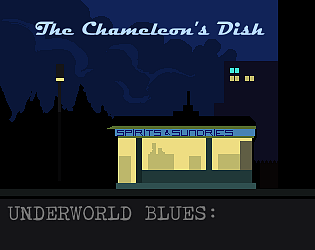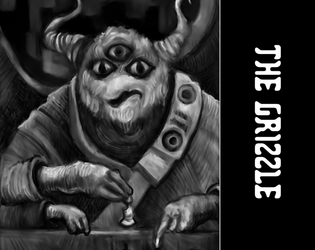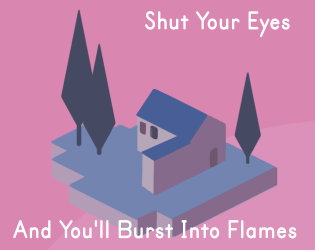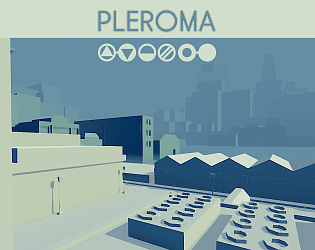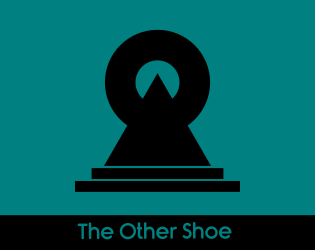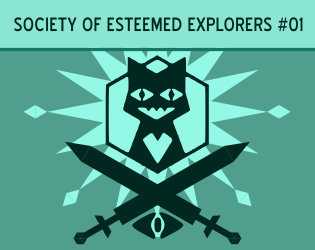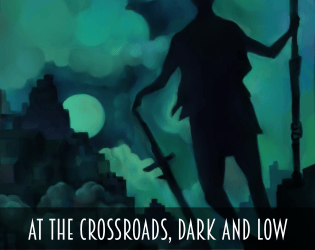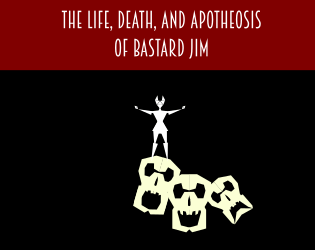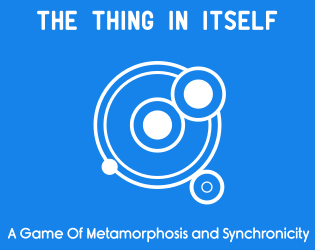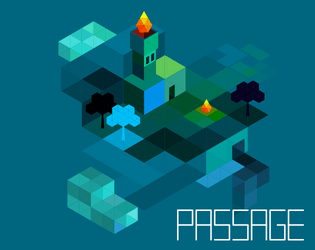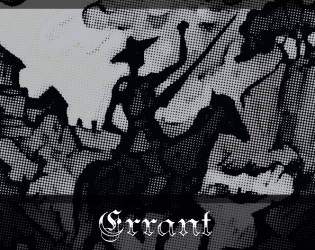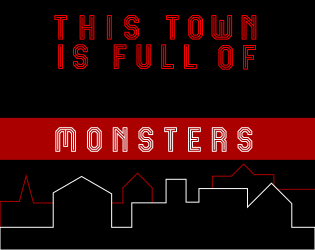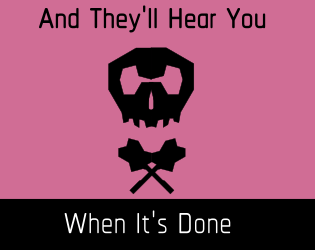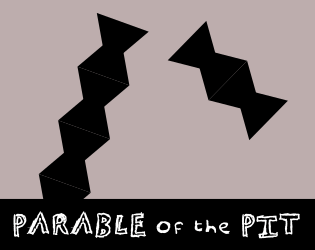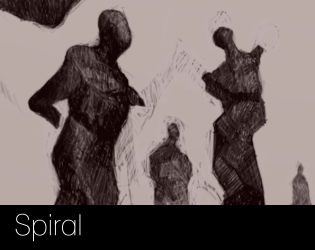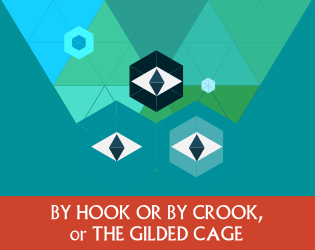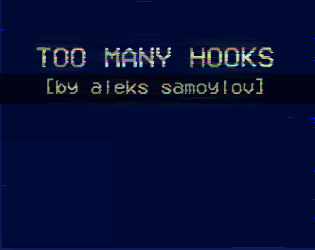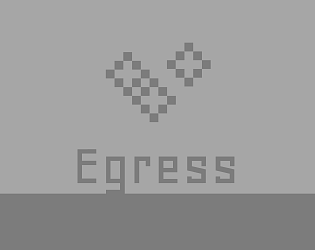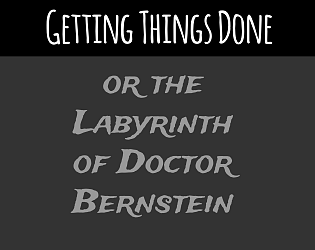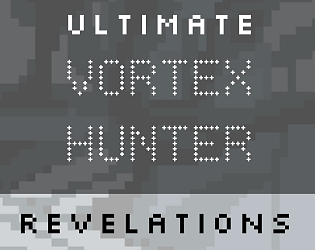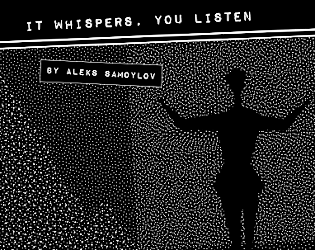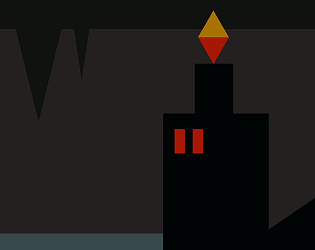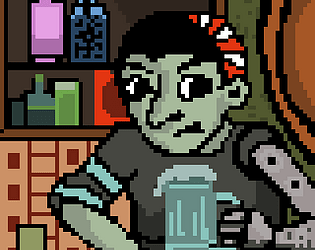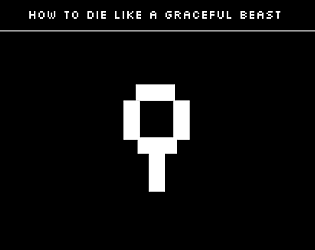Sorry for the delay there, but I'll still wish you luck regardless, whether or not you managed to move mountains or not. I am not really big on heavy lifting myself, so I hope that even if you didn't, you still managed to get some good ideas and a few interesting bits of foundation laid down. Whether or not I submit to any particular jam, especially the short ones, is always up in the air, but they can be a good source of ideas and either way.
Aleks Samoylov
Creator of
Recent community posts
I figured it was probably something like that... I suppose it's maybe easier to pass off AI music than AI art or writing, due to how naturally abstract music tends to be. I am sure a proper, trained composer could tell the difference - I know I can usually tell a piece of AI art and writing from a mile away, espcially the former - the most advanced looking, fancy, "realistic" AI makes the kinds of "mistakes" that even a total beginner human simply wouldn't (a newbie might have poor shading, inconsistent lighting, or an odd perspective, but we, as a species, don't tend to render things "clipping" through surfaces or floating freely - an observation that speaks a bit to the methods by which these images are machined together out of disparate, scavenged pieces).
It always baffles me, however, when less than scrupulous folks try to scam others by taking on the mantle of competent artists, because, having been a "professional artist" for my entire adult life, and having known many professional artists in my time, I simply don't know where the "profit" step of that equation comes in. Maybe that simply speaks to how terrible I am at the business side of things. Clearly, someone, somewhere has managed to pull this off and run into the sunset carrying a large sack with a dollar sign printed on it, but for the most part you can make hundreds of pieces with your own two slowly breaking hands and maybe see a few bucks here and there, if you're lucky.
Anyways, I'll definitely check out the discord.
I am probably not in the best mental ... situation right now to be accountable to anyone but my own self (plus, there isn't a ton of time left in this jam, and, like, any jam period less than a month is a real crap shoot for me), but I would be more than happy to talk shop, share tips, and even share my code if / when it's done. I am mostly using Godot these days, in case that's a factor.
As a side note, I am finding it kind of perfect for this purpose. It's got strengths and weaknesses, like all engines, but its UI features are a definite strength. I am finding it a lot more intuitive and straightforward than Unity in that regard, which is probably why it's become relatively popular for building non-game applications.
I don't know if just under a week will be enough, as I just stumbled onto this today, but, well, I've been meaning to put together a "simulated OS" framework in Godot (think Her Story or Pony Island), just because, and this might be a nice opportunity to at least get started with that.
Unrelated question, but not worth a separate thread:
Has anyone noticed that almost every community forum on every jam is specifically flooded with sound design and music folks looking for teams? If you're one of those folks, could you explain why that is, or why you think that might be? Is there just a big push in music schools and such towards getting their alumni into the games industry or something? Why are there so many composers popping up everywhere, in numbers greatly disproportionate to those of visual artists, writers, animators, coders, etc. Is it some sort of strange spam? Is it people using AI to generate music trying to pass themselves off as composers for ... profit (if so, how, it's not exactly a historically profitable field, none of the arts are, and being able to churn out endless amounts of low quality stuff has never really made anyone rich)? It can't be because there are more musicians than there are visual artists - music is, like, kind of hard, right? It's one art form that I personally find very difficult to access ... being a jack of (almost) all trades and a master of (almost) none, the ability to compose is one thing that I personally find lies furthest from my reach. I'm just genuinely curious. Maybe more than curious. This fascination has been building up in me for months and months now, and I just can't resist asking. What's up with that?
Now a separate post born of my compulsive pedantry. This is not a comment on the theme itself, but simply an unsolicited pseudo-educational PSA / screed / pet peeve, for anyone who might not know much about this topic and is interested. This might allow such folks to be better informed when invoking the Dunning-Kruger effect in discussions outside of the specific ruleset defined here.
Firstly, there is a lot to suggest that the "effect" itself is largely bunk, or at least not consistent enough to be considered anything beyond ... a phenomenon that sometimes occurs, but not necessarily in a universal correlative or causal pattern. This is true for a lot of experiments and studies in the social sciences, and no shade to Dunning and Kruger themselves. It's just that their results are predictably limited and don't (and perhaps can't) account for the breadth of cultural, social, and individual factors at play. It IS, in my opinion, a useful phenomenon, and potential fallcy / bias, to keep in mind if one wants to live what might be called "an examined life," so it's not like I'd throw the baby out with the bathwater on this one. It's good to constantly examine one's own faults and limitations, and doing so can probably make us all wiser, if not necessarily "smarter" or more competent.
Secondly, and this very much complicates and informs the above, the idea that the DK effect is about inherent intelligence is a common misreading. It primarily deals with the discrepancy between one's actual competence and knowledge, as applied to specific and discrete areas, and one's own perception of their competence and knowledge in that discrete field. Might seem like semantics, but this becomes an important distinction when we, collectively and individually, try to examine ourselves and our biases, because it implies, correctly, that nobody, and I mean nobody, is excempt from this so called effect, regardless of how book-smart or street-smart they are - someone could be a Nobel prize winning theoretical physicist and still easily fall prey to it, perhaps even more so, as they are likely to have an overinflated sense of their own general competence based on their other specific achievements. They might, for example, believe that they can quickly and easily figure out how to fix the engine of their car better than a "common" mechanic, or may underplay the challenges of most artistic pursuits and assume that they themselves are inherently capable enough to paint like Sargent or compose like Beethoven ... if only they wanted to ... but, of course, they simply choose not to try ... because they have more important things to do.
Of course, one can have demonstrable proof of their brain's "above average" cognitive speed and processing capacity, and still fall victim to the effect's flipside, which essentially means that they experience severe imposter syndrome, regardless how many awards or accolates they accumulate, regardless of the fact that they are, objectively, the world's foremost expert on X, and teach a course on X at Columbia. This, of course, is a matter for them and their therapist to sort out. However, pretty much all people are equally susceptible to both sides of the cognitive bias, and there are absolutely various cultural and socioeconmic factors at play that have nothing to do with what we'd call "inherent intelligence." There are plenty of people who, due to circumstances outside of their control, end up "underperforming" in a variety of areas, and blaming this entirely on their own perceived lack of competence and intelligence. Similarly, when someone has had everything handed to them their entire life, they are more likely to feel justified in all kinds of internal Dunning-Kruger nonsense, whether they are actually below average, entirely average, or highly intelligent.
And that's just a really long winded way of saying what most people without my particularly awful brain, and yeah, I recognize both the resonance and the irony in this statement, could probably explain in just one short paragraph.
In short, the actual, real world Dunning-Kruger effect has nothing to do with how "smart" or "stupid" anyone is, and is in fact a cognitive-bias that NOBODY gets a pass on and EVERYBODY can be, and likely has been, at one point or another, affected by - it, in itself, is really just a very messy overcomplication of what I'd consider a fairly solid bit of folk wisdom (i.e. hubris is bad ... remember, thou art foolish ... etc.)
I'm still deciding on this one ... Might actually give it a go this year, depending on scheduling stuff. I am not personally a huge fan of the mythology surrounding the DK effect, nor do I get much of a charge out of most stories that place a hapless intellectual "ugly duckling" in a sea of foolish intellectual "swans," but therein might lie the potential for an interesting challenge...maybe. If my OCD driven pedantry can get past the initial hurdle. That, I suppose, is my own albatross to bear.
I do have one question / clarification request.
When you specify that [the fact that the MC is "smart"] "can't be revealed until the end," do you mean to the audience / player of the game, or the protagonist? I am assuming it's the latter, because the former option feels like it'd be close to impossible to execute without obfuscating the theme itself (i.e. if the unwitting player can't tell that the MC is the most competent person in the game, either througout the entire game or until the end, then how could the judges possibly know for sure if the game is even adhering to the constraint and isn't about a character who is actually the least competent person in a milleu of incompetents), but making sure, just in case,
Thank you. I am always so happy to hear this sort of thing. The kind of stuff I'm into making tends to be pretty niche, so I don't hear from players / readers / etc. very often, but learning that someone has had a genuinely memorable experience with one of my creations helps me keep going.
The confusion and fragmentation are, of course, part of the intended experience. I will say that there is an underpinning narrative that I personally subscribe to, and a few interpretations I've heard that I think are just as valid, but I'm the sort that likes to let people come up with their own readings and don't want to explain too much. I'm a big David Lynch fan (which is probably obvious) so I tend to subscribe to his viewpoint on art, narrative, and mystery - if everything is explained by some canonical "voice of god" / authorial figure, then the mystery dies and the story simply ends. There is nothing inherently wrong with that - there are a lot of excellent stories out there that are neat, tidy, and linear. But I think effective surrealism, and surrealist mystery, is all about trying to get the questions and incongruities of the story to take up residence in the audience's head rent free, and stay there as long as possible.
So, you know, I'm really glad that it had you wondering! And again, thanks for the kind comment!
Hey, sorry for the delay. First of all, thanks for playing, and I'm so glad you've enjoyed it!
If I am understanding correctly, you can get a clue to the second warp in the Tuner facility from one of the "generic" (flat texture) NPCs who hang out in the "observation deck" area right outside the spawn in. Of course, not all warps go to different places, so you've probably already accessed the location this one leads to from a different world. I think it leads to the dark / empty version of the desert area. I think the only other portal in the facility is the "normal" one, past the door that unlocks after you pick up the Tuner.
As for the combination lock, I will be the first to admit that the puzzle that guards it is ... unreasonable. To some extent, I guess that was a matter of "artistic vision" winning against good game design. I got pretty enamored with the idea of a "secret area" that was so hard to get to that it might as well be an urban legend ... I am not sure I can say that I "regret" it per se, but I definitely understand the frustration it causes.
Anyways, I think there's actually a thread in this very discussion board, from a couple of years ago, wherein a few folks and myself go into a bit of detail on how to solve it. I think one person actually did. Another person went into the game files and simply removed or opened the door, and frankly I salute them. I think that also counts as solving it, from a meta sort of perspective.
In any case, I think that thread should help, but I can also try to look up the solution in my files.
Word. I mean, most people would call the Zero Escape games "visual novels," even though they have a bunch of very puzzly and gamey puzzles in them. Speaking to the vague nature of the label, interestingly enough (to me personally, at least ... I just find this particular case really fascinating), there are too many people that disparage Persona 3 Portable for being "just" a visual novel - despite the fact that it has exactly the same core gameplay loop as every other version of the game, the exact same story, the exact same level of interactivity and choice, the exact same Tartarus grind, and at least double the amount of content, even when compared to the recent remake. And those same folks rarely call Persona 5 or the aforementioned remake "just visual novels," even though, ultimately, they are like 80% visual novel mechanics with 20% of dungeon crawling sort of ... attached.
Genre labels in games, and by "gamers," are a trip sometimes. But I digress.
I doubt this would be a problem. In fact, it's not really all that unconventional. While there are ostensibly fewer DRPGs that use that kind of system than those that use more of a jrpg style turn based one, it's a pretty natural fit and is hardly unheard of. There are also some hybrids around. Legend of Grimrock uses a similar movement model, but, instead of simultaneous moves, has it happen in real time.
A simultaneous turn system along those lines is also not the worst to code, though pathfinding and AI are always kind of a pain, and this framework can end up being more structurally complicated. I made a prototype of this kind a while back, and I'm hardly the best coder. So if I can do it, it's probably quite achievable across the board. That said, if you want to implement it from scratch in under 8 days, along with doing everything else, it'll certainly be a challenge.
But then, I guess that's kind of the point.
Grimrock does, indeed, fit into the format. The Grimrock games are an example of one of the two broad, most common subcategories in that they have essentially real time combat/interaction on a grid, wherein the players, traps, monsters, and etc. can act on their own. If you go afk without pausing in Grimrock and there's a snail coming at you, it will eventually reach you and kill you without any input from you directly. I enjoy LoG a great deal, but it's not really my favorite scheme simply because it can lead to some really awkward juggling and strafing gameplay on occasion. It's not bad by any means. I just prefer to take my time.
The other most common format is essentially grid movement, just like Gridrock, mixed with "JRPG" style turn based battles. I put that in quotes just because the actual provenance of this particular mode of gameplay is more complicated than it simply being western or Japanese in origin. I suppose the whole Drpg genre owes the most to the old Wizardry games, which basically showcase the journey these mechanics took across the world, with Wizardry being a western game that happened to make it big in Japan and ultimately contributed to the genre fluorishing over there (while it largely stagnated here, until indie gaming started to sort of give it a bit of new life). Wizardry itself, the IP, was eventually bought out by a Japanese company, with the most recent installments being Japanese in make and origin.
But I digress.
The older Wizardry games featured "JRPG style" turn based combat. I haven't played all of them (and none of them to completion), but I think most of them were turn based? Wizardry 8 is a departure to some extent in that it uses a sort of hybrid "real time with pause" sort of system. Anyways, a lot of DRPGs use that combat paradigm to the this day, with the more real-time variant being less common, as far as I can tell. Sometimes it's got random encounters, sometimes monster icons roam the map and you gotta collide with them to initiate turn based combat, sometimes it's a mix, and of course the actual combat mechanics can vary widely once you're in it, but the core is very much the same.
There's a third possibility I see occasionally (and have played around with designing myself) that's more akin to the old school Rogue style of movement and combat. Basically, enemies, traps, and the player move on the grid, just as they do in Grimrock, but every movement and action takes a "turn" and standing still does not progress time. So enemies only move when you move, basically. I am bit more of a "turn based JRPG" girlie myself, but I also like this modality quite a bit, since it combines the added immersion of the real time format with the ability to take your time and strategize.
As for which one is easiest to make, well ... I've tried them all in my time, and I honestly can't say ... they all have their own pitfalls and challenges, and I imagine it might vary widely from person to person. One nice thing about taking the turn based JRPG approach is that you don't have to implement pathfinding AI and such, so that's probably what I'd generally go with in a time crunch scenario.
But, yeah, as to your question, examples ...
For real time, I wouldn't really recommend going too far back (or too hardcore old school) if you're new, simply because that experience can get quite rough and frustrating. The more user friendly and modern Legend of Grimrock games is about the best bet. If you're looking for more of that, the Vaporum games are pretty great in most aspects. I haven't played Lockdown yet, but really enjoyed almost everything about the first one ... besides the writing and the story, which were competent but just not to my taste. The dungeoneering, encounter design, combat, puzzles, were all very enjoyable in it.
To check out the turn based variant, well, there are a lot of options ... Again, I probably wouldn't recommend going too far back, but you wouldn't have to, as they are getting made to this day. Unfortunately, since they are a bit of a niche within a niche within a niche, the newer ones tend to get released for AAA prices or close. I had a fabulous time with Undernauts, and absolutely loved Labyrinth of Refrain and Labyrinth of Galleria, and I think all of the above are fairly accessible for newcomers, but of the set, only Refrain, being the oldest of the three, is particularly affordable, usually sitting at just under 20 bucks. You may want to try and catch a sale, or maybe pick up a physical copy somewhere second hand, if you can. I obviously think it's worth supporting these studios because, you know, I happen to love this subgenre and want more of it, but money is hard, and if you're not sure what you're getting, or if you'll even like it, it can be a tough sell.
Going slightly older, Shin Megami Tensei: Strange Journey Redux runs very well on Citra ... though OF COURSE you'd first have to own a physical copy of the game, OOooobviously (either way, Atlus isn't exactly going to be hurting for cash any time soon, and DS and 3DS game access and preservation are a mess, so, you know, do with those opinions what you will).
And, of course, there are a ton of fun, free examples made by participants of this very jam in years prior.
Hmm, my Playnite picks up my itch.io games no problem, including free ones, I think, so long as they are listed in my itch library. However, I do have the itch.io app installed on my PC, and it's possible that Playnite is drawing its data directly from the app, and not from the account itself (since all it really does for pretty much any game from any platform is open up the platform - so, if I click on a steam game in Playnite it will open steam, if I click on an Epic game, it will open Epic, etc.?) It seems to piggyback off of the existing launchers, is what I mean. Do you have the standalone itch launcher installed?
That aside, you can also add games manually by creating an entry and pointing it at an executable. You can also even get emulators and emulated games listed (with all proper legalities considered, of course).
I wish I had more time to actually explore everything that's been put out over the years. It's a veritable trove. But most days I have a hard enough time just getting out of bed, and it's not like there's often an opportunity to actually play these games - they end up being more like ... mental artifacts, I guess. I wrote one of these several years back. It's called Passage and is basically a prompt generation engine for a solo adventure / dungeon crawl / divination. It doesn't really have a built in setting or theme, but tends to work pretty well for solo runs comprised of short actions or scenarios. There are probably some community copies still on there, but if not, you can let me know and I can hook you up.
I used to be an ESL kid, back in the olden days. I don't really remember much of what we did in class, to be honest, but I certainly wish it was more along the lines of tabletop roleplaying games. Maybe then I'd actually remember. To be fair, at that age one doesn't stay in ESL for very long. The combination of pressure and immersion is one hell of a drug. I think I was fluent in something like three months after touching down on American soil for the first time. But, you know, you have to finish out at least the semester, so I am pretty sure it got real boring after a while. A bit of gaming could have livened it up.
To be completely honest, this is about as broad a theme as one could ask for. This isn't a bad thing, but I'd be surprised if it threw too much of a wrench into anyone's existing plans. I mean, a seven day jam is hard enough, I suppose, without an overly restrictive theme, so it works out. You could literally take any idea you wanted, tilt the lens ever so slightly to fit the theme, and you'd be fine. We tend to fixate on duality as having to do with binaries and the number two, but that's not ultimately what the word in its fullness refers to, having to do more with separation and separateness between discrete ideas or entities - they don't have to be opposites, and there doesn't even have to be two of them, since any act of "splitting" is a manifestation of duality, so if one thing splits in two once, that's duality, but then if one of those halves splits into two again, that's also duality, resulting in the number three, and if all of them split a third time, well, that's Numberwang!
To put it another way, non-duality is a state of unity - not multiplicity. Three, five, six, or five thousand are not examples of non-duality. A non-dualistic view of the universe, for instance, emphasizes the illusory nature of the perceived separation between all things.
Of course, even if you were to stick to binaries, opposites, strict dichotomies, and/or the number two, you're still unlikely to ever have a shortage of possibilities and options, because almost everything comes in pairs and almost everything comes as part of a dichotomy. Did you want to make an SMT clone / tribute? You've got duality baked into that whole franchise. Does your game take place in a hierarchical society? There you go. Sure, the good and evil dichotomy is everywhere and might feel a bit cliché, but at the end of the day it's those things for a reason - the conflict is immediately relatable and has clear, identifiable, and real stakes that are pretty much always relevant to the human condition. And there is no one way you have to go about it. Twin Peaks and The Lord of the Rings are both about that same duality, and one is among the greatest and most unique sagas known to man ... and the other is Lord of the Rings.
Anyways, despite the above spiel ... I probably won't even be able to submit a game for this, because I am WAY too mentally ill, old, and tired to do jams shorter than a month long (at least in my particular case, this sort of thing just doesn't fly anymore, sadly). Still, I am super excited to see what everyone comes up with, and will probably spend the week working on a game just to ride the vibe, so to speak.
I wasn't aware that itch was a free game assets site in the first place.
In any case, it's pointless to worry or speculate about the future. If you're an artist, keep making art - you'll keep getting paid next to zilch for it regardless of AI (which at the moment is mostly a lot of smoke and mirrors). If you're a billionaire, keep being a parasite - you'll keep getting paid a ton for it, regardless of anything. Eventually, we will all die. Eventually, the sun will burn out. The future doesn't actually exist, in any case, any more than the past does. From within our limited and ephemeral locus, it's just a horizon we will never reach. Only the present moment can be said to be real, and even that's questionable at best.
That's the sort of thing that gets me out of bed in the ... afternoons to mid-evenings. I am here for the mysterious and mystical Garfield content!
I am glad this game seems to have found its way into the hearts of a small but dedicated cadre of cool people. When you're making stuff, you just never know what will resonate. I honestly didn't think anyone would play this one, but I was glad to have been wrong on that account.
You might be able to have a trusted adult, probably a parent or older sibling, set up some sort of simple business entity and manage the financial aspects of things for you, and then sign the business over to your name once you come of age, but I am not 100% clear on the exact details and caveats.
Honestly, though, you're young, and unless you're in some serious trouble or live in a particularly dangerous place, you still have a few blissful years left of not having to genuinely worry about day to day financial matters, how to afford food and rent, how you're going to survive to next month. Enjoy it. It's a great time to build skills and knowledge in a low risk, low pressure environment, so that when you do get out there you have an easier time with things. But I wouldn't rush your entrepreneurial ambitions.
And yeah, there really isn't a simple way to get paid in gift cards for digital goods. Not that I know of. I mean, people could technically send codes to anyone they want by email and such, so you could maybe ask for codes as a sort of voluntary tip if they happened to like one of your games a lot, but that's honestly not likely to yield much, since people already have trouble paying for stuff if they don't have to, and adding extra steps never really helps the cause.
Hi,
Thanks so much for the kind words! Best way to contact me is either through here or twitter, but you can also try my email (person@alekssamoylov.com) - it's just so full of spam at this point that I don't really check it as often.
I will be the first to admit that I made that puzzle way too obscure. Though I suppose it is meant to be a sort of long term mystery, I think I sort of designed for myself more than for prospective players. Can't really promise I won't do something similar in future games (it might be like Miyazaki and poison swamps ... a part of me just can't resist), but I've definitely learned a lot from the feedback I got on this aspect of the game.
Anyways, I will tell you that you are very close when it comes to the Light and Shadow phrases. In both cases, you have the correct region, and in the latter case, you have the correct location (it is, indeed, somewhere in the cave). When it comes to the Light phrase, the precise location of the phrase is most directly pinpointed by the verse "you called for help, it came out wrong." I do recognize that if one doesn't live in the US, the phrase may or may not be interpreted the same, but I ended up including it as a Twin Peaks: The Return reference. The way you reveal the Shadow and Light phrases is a bit different than some of the others (they require an extra step), but once you figure out how to reveal one, it will point you towards the method of revealing the other, as the two are analogous.
As for the earth phrase, it describes a location in the "Alternate Desert" region (the empty, dark, nighttime version of the desert). It may require a bit of running around, but it should be in or near a spot that presents itself as a somewhat obvious "point of interest."
Side note, the likely reason the game may have UX issues that other players haven't brought up yet is that, well ... there probably just aren't that many other players, honestly. I guess a lot of people technically own this game because of all the bundles it's been in, but very few people actually download it and play it (based on my analytics). Just the standard fate of most super indie projects, especially really niche ones. So it goes.
By the same token, being a one person team with very few friends who are actually into bizarro "dream simulator" style video games, I basically have to be my own QA department ... which is the biggest limiting factor for me personally (I can't do music either, but at least there's a lot of really good public domain music out there). While I playtested the heck out of it during the process of development, that unfortunately doesn't catch certain blind spots, since some things feel obvious to me simply by virtue of me having built them in the first place. Like, the fact that there's an interactable door to the left of the TV never felt like an issue, but now that I think of it, it is absolutely possible that some players would reasonably expect the interactable doors to at least all be differentiated by color, which in retrospect would have made sense in the apartment. It was ultimately a subconscious choice of style over usability, in that I liked the fact that almost everything in the space looked like it was made of the same gray material.
Anyways, while other players rarely hang out on here, the one advantage of it being a small game that nobody plays and me being a small dev that nobody knows is that I do try to offer support on here as much as I can. Since the game is pretty large for a hyper-indie, there may be other issues and bugs along the way, so let me know if they crop up. For the most part, the bigger known issues are UX oriented and shouldn't be game breaking.
The player is ultimately supposed to not know where to go or what to do most of the time, but it was definitely not my intention to make it so they couldn't leave the first room :)
Yeah, you are getting the correct number. It's actually 1451. When I said 1461 above, I was basically falling for my own overly convoluted nonsense and was mistaken. The symbols for the numerals 5 and 6 were transposed on that poster. Again, I suspect there was some obscure in-lore reason behind that, but at this point I just don't know for sure anymore. If that was the case, I definitely wouldn't make that same design decision if I was making the game today. That puzzle already has enough steps to it even without the weird red herrings and inconsistencies.
Okay, I think I've figured out what's going on here. As usual, this is basically mostly my bad.
The number 391 converts to 1451. So you are partially correct in that it's supposed to be a 5 instead of a 6. As for the 2, the cross inside the circle is supposed to be a 4, and the diagonal dash inside the circle is a 2 (note that the two is not a diagonal on the actual puzzle input panel but is a straight line). I can't fault you for getting that confused, because on the poster in question, not only is the 2 slightly different than it is elsewhere, but the numeral that is used for 6 elsewhere appears to be used as 5.
Now, I strongly suspect that this was somehow intentional on my end, and that there's supposed to be a clue somewhere about how the scholars investigating that place/symbolic system have an incomplete and partially incorrect "Rosetta stone" (or else one that uses a slightly altered numerical system that changed over thousands of years) and the player is likely supposed to figure out the scholar's mistake through context by realizing that the letters containing that numeral are off ... BUT, that was three years ago (or four, I think, I don't even know anymore, feels like a lifetime ago), so assuming that this was really just me trying extra hard to be "clever," I once again disagree with Past-Me's decision very much, because I now feel like the puzzle is already complicated enough without introducing additional red herrings with transposed symbols and such. I think at the time I actually was afraid it wasn't difficult enough, which, now that I am having trouble digging through it myself I realize was not the case. I may have overcompensated a bit ...
Or maybe I just used my own early variant, which changed over time, but I totally forgot about making the adjustments on the poster? Or something.
But yeah, in short, you're not doing it wrong (with the exception of the numeral 2). On that one particular poster, the 5 and 6 are, indeed, transposed. So that is, in fact, 1451 and not 1461, as it may initially appear.
God, I need to go back to this game and maybe do, like, a "director's cut" where I cut some of the more BS steps from the puzzles and maybe spruce up the visuals a bit.
Hmm, it's been a while since I've gone back to this game, especially with a whole pandemic in the middle. Could you refresh me on which phrase / code you are trying to convert? I have all the answers on a text document ... somewhere, so I'll see if I can dig it up for reference, but if you let me know what the original text input was that let to that specific gematric value, I should hopefully be able to figure out what the issue might be.
I've used Scribus for almost everything so far. I planned to migrate to Affinity Publisher and got myself a copy on sale right before the Pandemic hit. But then it did hit, and I got super depressed, and haven't really published anything since, aside from fulfilling the in-progress Kickstarter at the time, which was already grandfathered into Scribus. So I guess it's still technically Scribus. I used to use Inkscape for the character sheets though. And the cover art, usually. If it's small enough, sometimes I just use LibreOffice or even just the PDF export functionality baked into Google Docs, but if it's more than like three pages it's always been Scribus.
Thanks for the response. I've already read through the content at that link, and while it clarifies some things, I am still finding the issue a bit tough to navigate.
I guess it boils down to the fact that, as a sufferer of several fairly severe mental illnesses and a person who plays a lot of games, I have never once, in all my years of both the playing and the suffering, come across a game that was explicitly trying to be therapeutic and actually succeeding. Any time a game has explicitly tried to do this, it felt, for lack of a better word, irritatingly preachy. Unlike a therapist, a piece of software cannot address the extremely individualized and idiosyncratic aspects of any given user's struggle, so its attempts to guide me towards feeling better usually aren't tailored to me, or even just me in that precise moment, under those precise circumstances, and thus feel like an attempt at a one-size-fits-all didactic approach.
Now, I do play a lot of games, and I do enjoy games, clearly. And I have played many games that were able to help me kill a few dark hours here and there (only when my symptoms weren't too severe, of course, since past a certain point even something as simple as playing a game, no matter how engaging, is pretty much off the menu) but I've never played a game that genuinely alleviated any symptoms in any tangible way. I don't even feel less anxious, less depressed, or less prone to dissociation while playing, say, Myst (one of my favorite games and progenitor of one of my favorite genres) - instead, I am just an anxious, depressed, and dissociating person who happens to be playing Myst. On rare occasions, the pure escapism of a game can basically provide me a source of light distraction, and thus a bit of relief, but that's not really inherently therapeutic, is it? Maybe a coping mechanism? Maybe?
That is, unless distraction and escapism count as therapy in their own right, which I suppose I can see an argument for, though the phrasing does suggest something clinical even after the clarifications, and that trips me up a great deal. I do often appreciate that bit of distraction, despite the basically indisputable fact that as soon as it's over I am right back where I was before, no headway has been made in addressing my issues and no improvement has been made in my overall condition - I go right back to feeling just as awful as I was prior to allowing myself to get distracted, and can sometimes even feel worse if I allowed the distraction to monopolize my time because nothing else could bring any relief (essentially maladaptive self soothing). Still, "relief is relief, no matter how brief," and I understand the potential value of just killing a bit of time with something fun. However, if that's the criterion for what would be considered "therapeutic," in an adjunctive sense, of course, then don't literally ALL games, and ultimately all entertainment media, qualify as such? At least, doesn't every game serve that function for someone?
So then what is disqualified? Does Tetris count because it allows many people to relax and zone out for a bit? Since I personally find Dark Souls relaxing, does Dark Souls count as a therapeutic game, despite the fact that it has apparently been known to actually heighten anxiety in others? Could I submit a dungeon crawler, a shooter, a farming sim, a point and click adventure? Does the game have to reference the fact that it's trying to be a therapeutic tool in order to qualify (thus basically ensuring its status as "educational software")? As I mentioned above, whenever a game has done this in the past, I felt patronized by it and profoundly turned off, and you've got to remember that we mentally ill folks can be a prickly and very picky bunch, and we really don't respond well to being patronized when it comes to our illness in particular.
Now, if I am reading all the info correctly, then one can pretty much submit any kind of game so long as it centers at least one of the four tenets outlined in the article, and I suppose that's that. But it all just feels so vague and broad. For example, there are currently a bunch of games submitted to the jam that appear to be the standard bevy of cross-posted jam spam, but at the end of the day I actually can't think of a concrete reason, besides maybe the cross posting, that they shouldn't be allowed to stay up there. I mean, someone might find them to be helpful in regulating their emotions, or thoughts, or breathing.
I don't know. At this point, it just seems like I am overthinking it (obviously am), and that this really just isn't the jam for me. And that's fine in the grand scheme of things. I just find this to be increasingly the case with mental health oriented jams in particular. I always find myself wanting to participate in one, and always realize that it's simply not suitable to my specific bundle of illnesses, which feels extra painful because you'd think these would be the jams where people like me would be able to contribute quite a bit, and would be able to feel comfortable or welcome.
It's nobody's fault, perhaps. In this particular case, I suppose the OCD and the autism are doing the bulk of heavy lifting. Without additional clarity, I just can't conceptualize what is actually expected, and I am too afraid to attempt something that explicitly tries to help people like me in a clinical sense when I clearly can't even help myself and have simply never experienced a game of any kind or genre that I could confidently say addresses any one of my symptoms beyond simply serving as a (often maladaptive) coping mechanism. To even imagine that any work of art could serve as even adjunctive therapy feels almost trivializing to me (and I am a professional artist). These conditions are utterly devastating, and we have to live with them day in and day out. We don't get actual breaks. Even with treatment, they never completely go away, and all that regulating is often a constant drain on our energy and time that others do not have to deal with. And while I appreciate the bits of distraction and relief a game of Tetris can sometimes give us, it feels like an overwhelming, impossible, herculean task to try to plug a gaping abyss with a handful of tetraminos.
Well, either way, at this point there probably isn't enough time left for me to really submit anything anyway, but I do hope that maybe these rants can at least prove somewhat helpful to you, as feedback for future jams.
Thanks. That does help somewhat, but does still leave me with some questions.
Based on the "Move, Breathe, Feel, and Think" paradigm, I am assuming analog games, especially in the LARP format, are encouraged? While most of the examples for the Move component feature video games that use motion controls of some kind, I don't think most people participating in itch jams have access to APIs or developer kits to actually be able to make full motion control experiences, let alone test them properly, in the short time span of a jam. There is probably some open source webcam based stuff that exists out there, but I doubt such a thing would be especially newcomer friendly.
The same goes for breathing. I am sure there are ways that I, as an indie developer, could figure out ways to incorporate breathing into the gameplay, but it would likely take me the better part of a month just to come to grips with the basic input / output implementation, let alone figure out how to work it into a design comprehensive enough to put forth as a competitive jam submission. I can think of a few basic implementations that use standard I/O (keyboard, mouse, controller) off the top of my head, but those cannot be truly interactive - the game cannot provide adequate feedback to the player without actually measuring their breathing, so it would have to rely on essentially telling them how to breathe and hoping they follow directions, or else ask them to breathe in time with their button presses, which might work with a lot of testing, but again relies on the player's ability and desire to follow directions with no way for the game to actually measure whether they are doing it "correctly" and providing them with rewards and encouragement.
Which leads me to the next question, which would be an issue that applies to both analog and digital games. We're game designers, and are hardly experts on exercise regimens, breathing rhythms, and their effects on the body and mind. Therapists generally have to go to training and seminars for that sort of thing, and when it comes to other "interactive" therapy regimens with biofeedback components, such as EMDR (Eye Movement Desensitization Reprocessing) there is a risk of actually doing more harm than good with the wrong application of a technique. Some of this can, of course, be remedied through research, but we hardly have the resources to do this properly within a jam context.
A corporation would hire an expert consultant on such things, and we obviously can't do that, which means we have to spend time we could be coding or making art poring through youtube videos on yoga, medical journals, wikipedia articles, and we probably could do this for hours every day and still not scratch the surface of understanding it after a full month. I doubt it's a huge issue with the breath component (though even then, I'd be worried about users with irregular breathing patterns or conditions such as asthma, and am personally not super comfortable with my ability to tell other people how to do something as crucial as breathing), but the movement component could be potentially fraught - even light aerobic exercise has procedures and orders of operation for safety and the like. When we're talking about recreational products, like Wii sports and Just Dance, it's probably not a huge issue, since players come with no expectations and the premise is simple and scalable to individual preferences - nobody goes into one of those games expecting anything beyond a bit of waggling about. As soon as we start specifically designing games for what is essentially a very specific medical purpose, we become subject to medical levels of liability, at least in the abstract. Sure, major issues or harm are unlikely, but if the game promises that it will make you feel better, in a clinical sense and with the intent of addressing specific clinical issues, and it not only fails to deliver but makes someone sick or injured (hopefully nothing more than a sprained muscle, but still) due to improper exercise instructions given by a keyboard jockey like me who, let's face it, knows diddly squat about proper exercise, then it's no longer just a "bad game" or even a "failed game," it's now "bad therapy" or potentially even a form of "quackery."
And that ultimately brings me to the original question. If the goal is simply to make games first and foremost, and make sure those games, in some abstract way, happen to encourage players to do a bit of light movement and very, very basic breathing exercises, without explicitly promising therapeutic benefits, then that's one thing. If we are supposed to be making therapeutic tools / "treatments" first and foremost, then we're in a whole different ballgame. And I am still not sure which one of the two modalities this jam is oriented towards. I am assuming and hoping it's the former, but the wording is more than a bit unclear on that front, both on the itch page and the deepwell website, which contains a LOT of additional information that I really wish was included on the jam page, as it seems rather important. Now, obviously the video indicates that we don't have to do all of the above, or even more than one, but I kind of feel like this is another one of those tidbits that could have been placed much more front-and-center, and also doesn't really solve the underlying conundrum I am experiencing here.
I could, for example, try to make a narrative game that incorporates CBT or DBT techniques for the "think" component, but those are modalities that cannot easily be generalized and really work best when applied to individuals and their specific situations over an extended period of time. They are also extremely deep rabbit holes and generally require training for professional therapists to be able to apply well. Just as with physical issues, and perhaps even more so, there is a danger that if someone presents these concepts as scientific fact, but does so incorrectly or incompletely, and if an impressionable player accepts them without some requisite skepticism (a younger player, for example) then it could actually cement harmful thinking patterns instead of helpful ones.
Both DBT and CBT have their proponents and detractors, and when it comes to the latter there are some good points to consider. Without nuance and care, they can veer away from regulating negative thinking and emotions into dictating cognitive rigidity, forcing patients to minimize their traumas and immediate pain, excessive self blame ("beating yourself up") for "not doing it right," and so on, and so forth. Now, none of those things are the intent of those therapies, and while some people find the methods more or less helpful, if they are presented with nuance by a trained and competent therapist in a one to one setting most of the above pitfalls can be avoided - at worst, the patient may feel that something like CBT is simply not helping them as much as they'd like. But if you read any of the foundational texts, such as Feeling Good, on their own, and fail to parse some of the potential issues, and then start presenting half baked misreadings of CBT techniques in a generalized format, you can actually do some real damage. Since not all therapists are, sadly, created equal, I've known several people whose therapists actively made them feel worse because they themselves didn't really understand the methodologies in question. Without a lot of careful consideration, CBT can turn into "law of attraction" style "I can think myself out of my pain, and if I can't I'm even more of a failure because it's basic science" nonsense, and DBT can turn into a complete denial of the very traumas that it's supposed to help address. And so on and so forth. In short, while talk therapy carries less stigma than medication when it comes to potential risks, the wrong cure can still be worse than the disease. At least when a patient fails to respond to specific meds, there is usually a managed procedure of stepping down and stepping up and very clear physical indicators. When you're locked into a warped process with a bad therapist, on the other hand, you may not know that there is a problem until years later.
So I guess in the end my question is no longer whether or not we're supposed to be making games that are about illness versus games designed to address illness. It does seem clear that it's the latter. At this point I am just more concerned with the extent that these games should be labeled as "therapeutic tools" and how this can be done safely by people who, like me, have no actual expertise in something as complex and delicate as mental health.
I don't contest the assertion that games can have real mental health benefits on an individual level. But it's one thing for me to say that Dragon Age Inquisition really helped me through a rough couple of months (mostly because it happened to be new at the time and distracted me for a few hours every day - not like it taught me any actual coping skills or genuinely treated my depression), and a whole other thing for a representative of Bioware to get up on a stage and say, "here's Dragon Age Inquisition, out brand new interactive therapy for depression and PTSD."
TLDR: I have actual OCD and autism, and once I start typing, I do not stop until every possible angle of an issue that I can possibly think of at the time has been addressed at least once, and thus there is no way for me to do an effective TLDR section without retyping everything. Sorry.
I'm a touch confused by the wording here and would love some clarification. Are games submitted for this jam expected to address mental health and mental illness as a topic, with the aim of destigmatizing the illnesses themselves and creating some level of representation and awareness for sufferers (something like The Cat Lady, or Senua's Sacrifice - I think the former was more successful than the latter, but that's beside the point) ... or are they expected to function as effective therapeutic tools in their own right?
If the latter, are these intended to have real clinical applications with real medical benefits for sufferers beyond a few minutes or hours of distraction? Let's say I have severe depression, PTSD, OCD, and anxiety (I do, in fact) ... are these games expected to provide an experience that, were I to play them, would induce me to feel tangibly better in the long term, such that the game could at the very least become an ongoing additional treatment option alongside my therapy, medication, support groups, etc.?
If so, could you provide examples of games that have been successfully used in this manner thus far, and I mean clinically and with clear, proven results, so we could have some notion of what to aspire to ... and so I could add those games to my own treatment plan, because honestly that would be amazing. Off the top of my head, the only thing I can think of is something like Superbetter, which I have tried, and which proved to be more of an overcomplicated, glorified to-do list with gamified components which ultimately did very little that a regular paper to-do list couldn't do.
While executive dysfunction is something many of us mentally ill folks suffer from, and while it is the low hanging fruit, so to speak, when it comes to seemingly addressable issues, it ultimately results in the creation of mere productivity software and doesn't address the core issue, since the mere act of using the software / playing the game (no matter how fun it is to a healthy mind) becomes "just another thing I am supposed to do" to someone with severe illness related fatigue, motivation issues, anhedonia, and executive dysfunction, which are pretty common symptoms for a lot of mental illnesses.
It's a bit like telling a depressed person to "just exercise' or "try yoga" - those things may certainly have long term benefits when practiced with consistency and rigor, but if you're already going through clinical depression, you may have a hard time simply getting out of bed, getting dressed, or showering. Jogging or yoga are usually out of the question. When it comes to games, I can get so depressed that my favorite games of all time seem like an utter chore. I was so depressed last month, and so deep in dissociation from the PTSD, that I was utterly uninterested in anything, including playing Elden Ring. I have been letting Elden Ring (Elden Ring!) just sit there, gathering dust, for weeks! Instead I basically just stared at the wall for hours, more or less. The very thought of doing something, ANYTHING that I absolutely didn't have to do in order to simply stay alive, was impossible.
So ultimately, any game that would successfully achieve clinical results, or even provide temporary relief during an actual symptoms heavy period (anyone can play games, or do some form of yoga, when they're feeling at least sort of okay), has to act on one's psyche so quickly, reliably, and effortlessly that it will easily and consistently be able to overcome that initial motivation barrier. It would have to be accessible in ways I can't even imagine. It's have to be something that I could pick up and feel better within a few minutes, and that sense of improved wellness would need to last long after I stopped playing. As of right now, there aren't even any medications that can do that (safely and without severe damage and risk of addiction). Antidepressants, which are comparatively safe and have a low side effect profile, take a month on average to actually start kicking in. Anything that provides relief faster usually has all kinds of risks, dangers, and caveats. Therapy with trained professionals can take many, many years before any long term results are seen, and those results generally come in the form of improved and refined coping mechanisms at best. Most of these illnesses don't have cures, only treatments and management options.
As you can see, I am quite interested in participating in this jam, as the topic is near and dear to my heart, but I am currently a bit skeptical if we're expected to attempt the second goal. A game ABOUT depression or PTSD is something I can make from the heart. If I were able to make a game that successfully TREATS depression or PTSD ... well, I'd have done that by now. Or if I am not fit for the task, I would have thought someone would have done that by now, and likely become fabulously wealthy as a result. I suppose I am open to trying to make "therapeutic" games if the inherent limitations of the exercise are acknowledged and addressed, and if the whole thing was treated, and judged, based on the aspirational study in hope and creativity. That would, after all, be an attempt to create a product that could literally change the world by simply existing.
On a somewhat related note, is this a video-game only jam, or are analogue games, such as tabletop rpgs and larps, acceptable for submission? When it comes to those media, I have seen some clinical application, or at least treatment adjacent applications, since larps especially are essentially designed to create catharsis and have a strong connection to the practices of psychodrama and certain forms of therapy. Even so, these have been limited in scope so far. Obviously, anything that could ellicit "trauma reduction" levels of catharsis also has the potential to simply intensify or trigger trauma, and the legal liability issues were such games undertaken as explicit treatment, would be potentially ruinous.
Are you talking about tabletop roleplaying games promotion? I don't know. Tell people on twitter and post it on Drivethru as well ... itch is great for a lot of things, but organic discoverability isn't one of them. If you're talking about a video game, this is the wrong forum (so I imagine you probably just spammed this message amongst multiple forums, or else it would have been obvious by the title), but eh, I have some time. I have "shipped" a commercial one before, and my words of wisdom are as follows:
1. If you want someone to play it and you're proud of the game itself, chances are it's good enough that a few people will find it, play it, and even enjoy it. Then it's not a waste anymore.
2. If you want a LOT of people to play it, and you want to make a lot of money in the process ... well ... you have to either get lucky or have a AAA marketing budget. Maybe shop it around to indie publishers as an alternative. There is very little that you, as a solo dev, will be able to do after launch.
3. Sure, you can send keys to every youtuber from here to the moon, but each one of them whose let's play would actually make a difference gets a bunch of free keys every day and are always going to be more successful than the majority of indie developers can ever dream of, because a lot more people are likely to form a parasocial attachment to a funny guy, gal , or nonbinary individual who plays video games on video. Those youtubers will thus treat you as interchangeable and disposable unless you have a publisher or big money to back you up. Chances that they will play your game above other more profitable, views-generating big names is almost none. It's not zero, but it's very unlikely.
4. You can try to send actual press releases all over the place, but again, most outlets get swamped with them, and only a few small indie sites will cover it ... and that CAN get you those few players who will genuinely seek out, play, and love your game, but will NOT get you any more than that. If that's your criterion, then it can be worth it. If you actually want to sell it, hmm, your returns will likely be quite limited.
5. Social media can be a place to promote, but it's full of people who have seen you have multiple public depressive meltdowns and are owned by Elron Must and Markie Zuckerberb. Might work a bit to get a few players, but without a massive strategy or a lot of luck, it won't get you paid much beyond a burrito or two.
6. If you're really good at viral marketing, that could be something. Engineer some sort of publicity stunt, maybe, or set up and ARG ... but in that case you basically would have to create a whole new game with real world gameplay just to promote your first game. If you're really talented at that sort of thing, though, it could be worthwhile. ARGs aren't inherently monetizable, but they CAN get pretty viral sometimes, and if the ARG is good and engaging enough, then most aficionados don't really mind that it ultimately gives them a sales pitch at the end. Not all ARG participants will convert to buyers, though.
7. In person networking can help, I hear, but that means going to conventions and being not only social but socially adept, like maxed out on charisma. It also probably means covid would have to end, and it doesn't seem like that's every happening at this point ...
8. Consider running a modest Kickstarter before launch, even if you don't need the money to make the actual game. It's a good enough promotional tool, and if you fund then even if you sell zero copies later, at least you'll get a nice little chunk of money up front and will have a small but inherently interested player base ready to experience your game when it comes out.
In conclusion, there are options. But if you want a LOT of people to play it, those options get much smaller. You may hit the jackpot or you may have a game that lingers in obscurity forever, and it's really hard to know which factors lead to one or the other outcome with any amount of certainty or reliability. Just as it is in pretty much every creative field, really.
Good luck. I hope you do well, for what it's worth. Don't mean to be discouraging. It's just the reality of the "industry," and most similar or adjacent industries, sadly.
Interesting to think about, certainly.
As far as I am aware, the method for "rating" games on itch is exactly what you've already seen, a bit of an out-of-the-way / almost hidden page where one can write a short review and give out some stars. The problem with this, aside from the fact that it's not really "critique" in any traditional sense, is that itch.io's discoverability is already garbage, and the algorithm is apparently very brutal and devoid of nuance (likely as a result of itch being a fairly small, low budget platform that can't afford to cultivate a powerhouse algorithm) such that if any game gets even one rating below five stars, it's visibility may suffer disproportionally. Of course, this may be mere rumor, but it's said that even a single four star review has been known to hide already difficult to discover games in some nether-region of the search results.
Either way, just in case, it has been somewhat accepted practice amongst the indie developer communities and scenes in my neck of the woods (most I know are based in anglophone countries, with highest concentration in the US) not to leave ratings below five starts on any indie project on principle, so as to avoid actually harming the designer based on something as subjective as opinion based evaluations. Potentially, it can work the other way around, where giving out five star reviews on principle can be seen as a way to show support and solidarity and potentially improve search results. But as is the case with most algorithm based systems, the actual efficacy or veracity of any of the above is hard to verify.
Of course, this then circles us around to the fact that these ratings systems do not actually constitute "critique." As an alumnus of a semi-traditional fine arts college, I am fairly familiar with the concept and process of peer critique, both in terms of taking critique gracefully and dishing it out constructively, and for me it always comes down to two questions.
First, is the critique genuinely constructive (can it be practically applied, is it relevant, does it actively take the role of the personal preferences, opinions, and biases of the critic into rigorous consideration)? If not, then it's not worth engaging in - while we are dealing with art here, it is also art that doubles for many as a commercial product and a source of income, and that may come with limitations. For example, if a game has already been fully published and released and its designer has already moved on to other things, then peer critique isn't applicable or relevant. The thing is what it is. Sure it can be revised (if the release is digital only), but only if the designer is open to that and capable of devoting time to that from a practical perspective. Similarly, if the critique addresses something that is outside of the designer's practical or logistical capabilities (such as the inclusion of artwork that they simply don't have a budget to commission), I again would general refrain.
The second question, when it comes to peer critique, is much more important to me. Has the critique been invited or solicited? If not, then I usually find it rude to give out without asking. This happens way too often in art scenes when certain members become a bit overzealous and overenthusiastic. Back in college, I was home for the summer once and had a friend over who was also an artist, and a student at a different school. She spotted a painting I had done that year just sitting on the floor, and began to give me all sorts of unsolicited advice and criticism, without any prompting or discussion. She didn't even bother to first acknowledge that it was there, ask about it, or ask whether I wanted to talk about it. She just started going off about how I should consider using a more neutral color alongside the flesh tone there, and how she didn't find the perspective convincing, and blah blah. And look, I was in school too, and I had already had that painting critiqued by professors and even a famous visiting painter or two, all of whom gave contradictory crits, and I was tired of it and it was finished, as far as I was concerned, and I was on summer vacation, happy enough to just do art for my own enjoyment for a few months. It was just plain rude. If she had asked, that would be a different story, of course.
But all of that applies specifically to peer critique. When it comes to press critique, that's ultimately a field that, for better or worse, exists on a separate plane from the actual creators, though there is overlap between the participants. In games, both analog and digital, our biggest problem right now is the fact that there simply is no reliable outlet for thoughtful and useful criticism, as most writing about games is dominated by the Enthusiast Press, which is half content-mill and half marketing arm for the bigger corporate players. That isn't to say that thoughtful, qualitative pieces aren't being written, but that they aren't really the norm. When it comes to tabletop, I can't really think of where to even look for some of this sort of work. It's much easier to find quantitative "reviews" of any given thing, again going back to star ratings and grades that attempt to quantify subjective concerns and don't amount to substantive critique.
Of course, there is then also the question of how one does this in the tabletop medium, since it is largely concerned with the building of frameworks for the players to tell their own stories with and is ultimately and extremely odd blend of creative writing, technical writing, pedagogy, and systems design. But if I were to start musing on that I'd be here all day.
So yeah, honestly, problematic indeed. Ultimately, I am not really one who concerns themself with criticism and critique all that much, but I do understand that having centralized outlets for such things can definitely have positive effects on the ecosystem of a creative scene, whether I personally choose to engage with that or not. I imagine at this point, if we actually found a healthy, primarily positive, and nuanced way to talk about an extremely interpretive and multifarious medium, an outlet that wrote about indie games as a sort of "art criticism" could be well appreciated.


